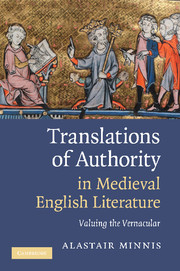Book contents
- Frontmatter
- Contents
- Preface
- List of abbreviations
- Introduction: valuing the vernacular
- Chapter 1 Absent glosses: the trouble with Middle English hermeneutics
- Chapter 2 Looking for a sign: the quest for Nominalism in Ricardian poetry
- Chapter 3 Piers's protean pardon: Langland on the letter and spirit of indulgences
- Chapter 4 Making bodies: confection and conception in Walter Brut's vernacular theology
- Chapter 5 Spiritualizing marriage: Margery Kempe's allegories of female authority
- Chapter 6 Chaucer and the relics of vernacular religion
- Notes
- Bibliography
- Index
Chapter 5 - Spiritualizing marriage: Margery Kempe's allegories of female authority
Published online by Cambridge University Press: 30 June 2009
- Frontmatter
- Contents
- Preface
- List of abbreviations
- Introduction: valuing the vernacular
- Chapter 1 Absent glosses: the trouble with Middle English hermeneutics
- Chapter 2 Looking for a sign: the quest for Nominalism in Ricardian poetry
- Chapter 3 Piers's protean pardon: Langland on the letter and spirit of indulgences
- Chapter 4 Making bodies: confection and conception in Walter Brut's vernacular theology
- Chapter 5 Spiritualizing marriage: Margery Kempe's allegories of female authority
- Chapter 6 Chaucer and the relics of vernacular religion
- Notes
- Bibliography
- Index
Summary
One of the devil's more ingenious interventions, as he laboured to impede the spiritual progress of Catherine of Siena, was the argument that she could well get married, since many married women were saintly.
Live the life that other women do. Take a husband. Be a mother of children. Bow to the law of human nature to increase and multiply. None of this can hinder the fulfillment of your desire of pleasing God. Have not saintly women been wives and mothers? Think of Sarah and Rebecca; think of Leah, too, and Rachel. Why should you make yourself an exception, taking on a kind of life in which you will never be able to persevere?
But Catherine was not fooled. She recognized this dangerous temptation for what it was, a means of compromising her status, effectiveness, and general credibility as a holy woman. Margery Kempe was not so lucky, having married long before her spiritual vocation became clear. Her claim that the Bible gave her leave to speak of God was met with doubt, downright hostility, and frequent accusations of heresy. This chapter will discuss the vernacular hermeneutics which Margery practised in respect of Luke 11:27–8 and Genesis 1:28, auctoritates which she recognized as being crucial for that claim. At its centre is a desire to transcend material, conventional marriage whilst remaining respectful of marriage as a sacrament and a normal life-choice for ordinary women.
- Type
- Chapter
- Information
- Translations of Authority in Medieval English LiteratureValuing the Vernacular, pp. 112 - 129Publisher: Cambridge University PressPrint publication year: 2009



